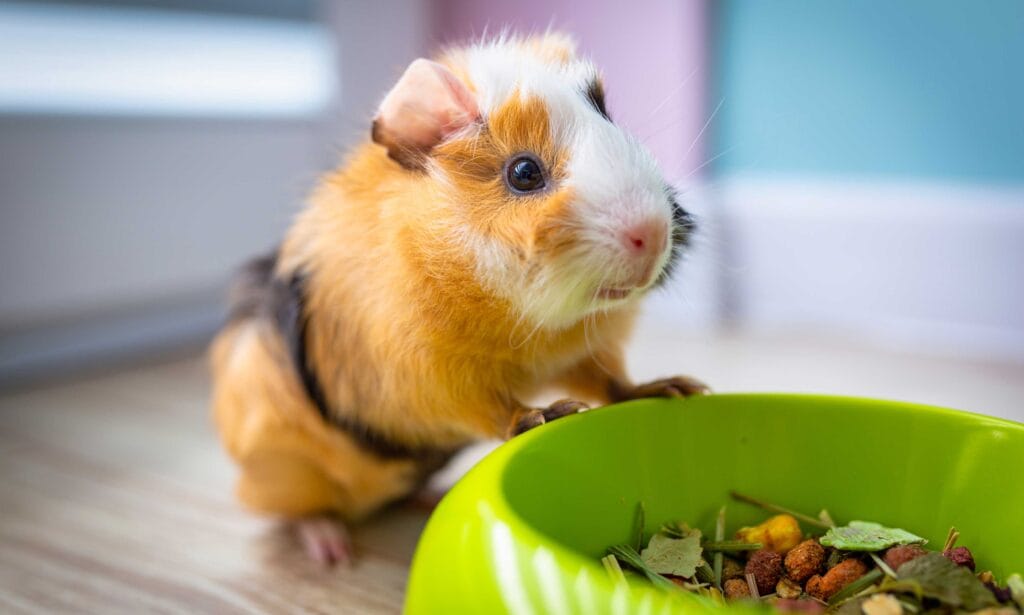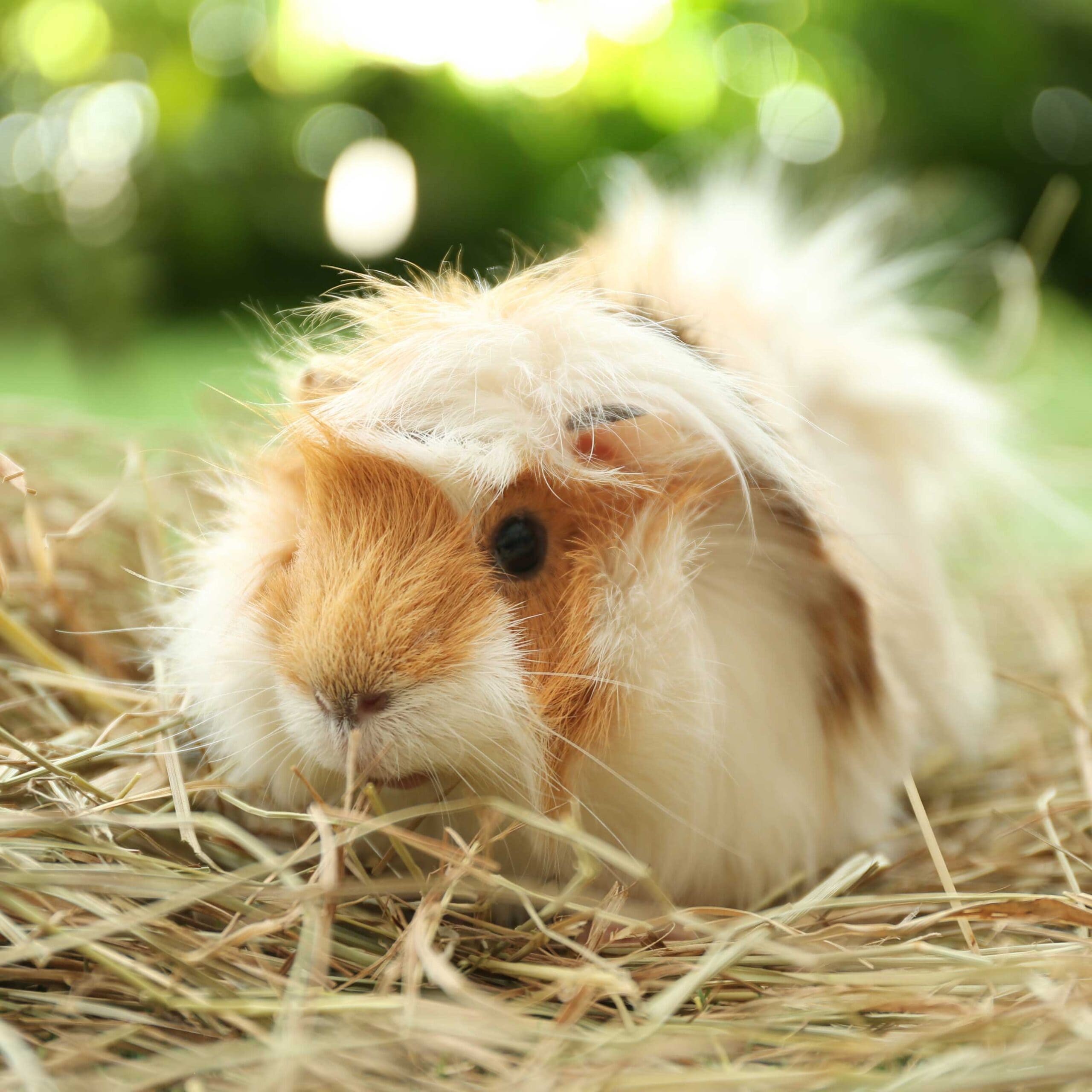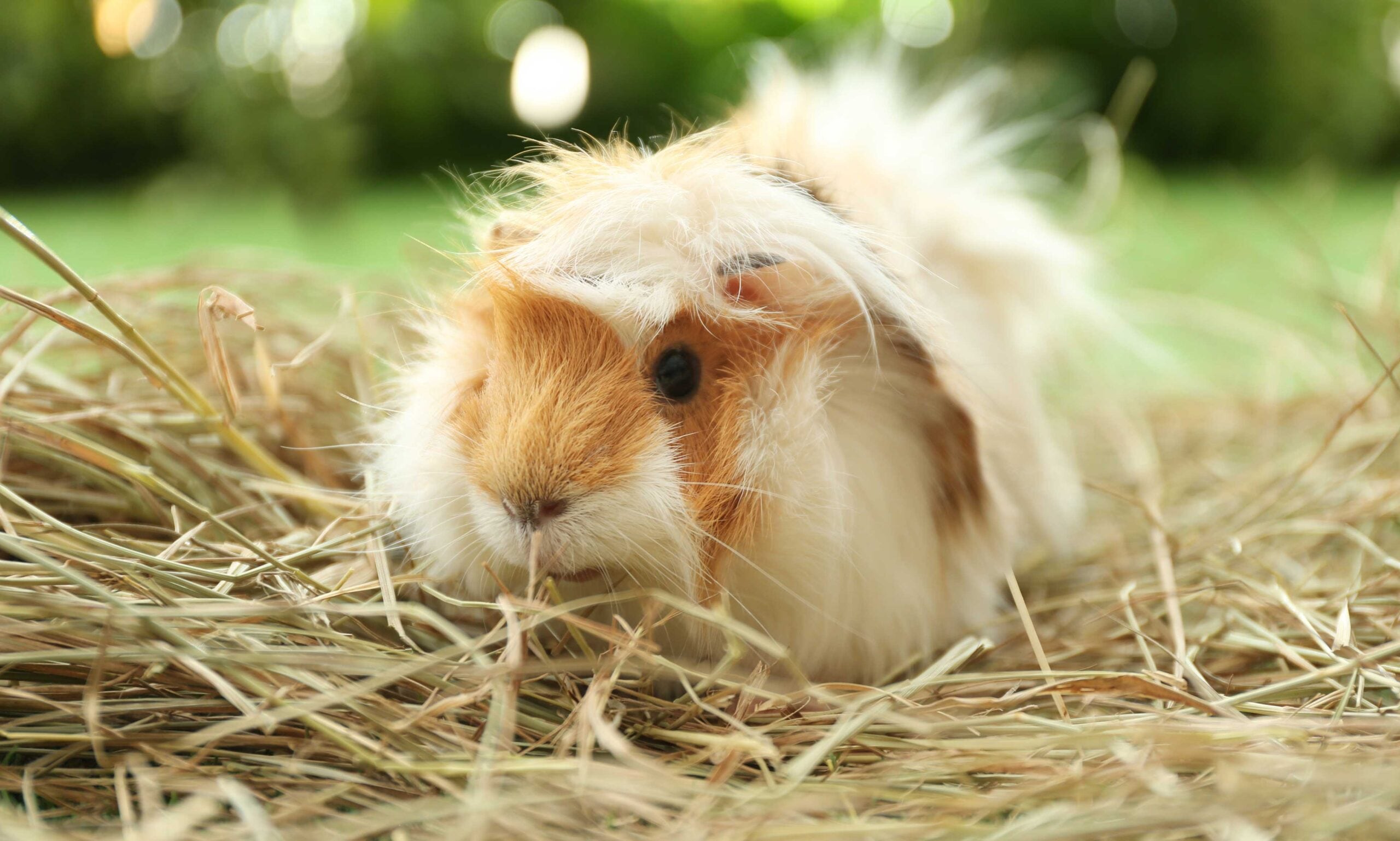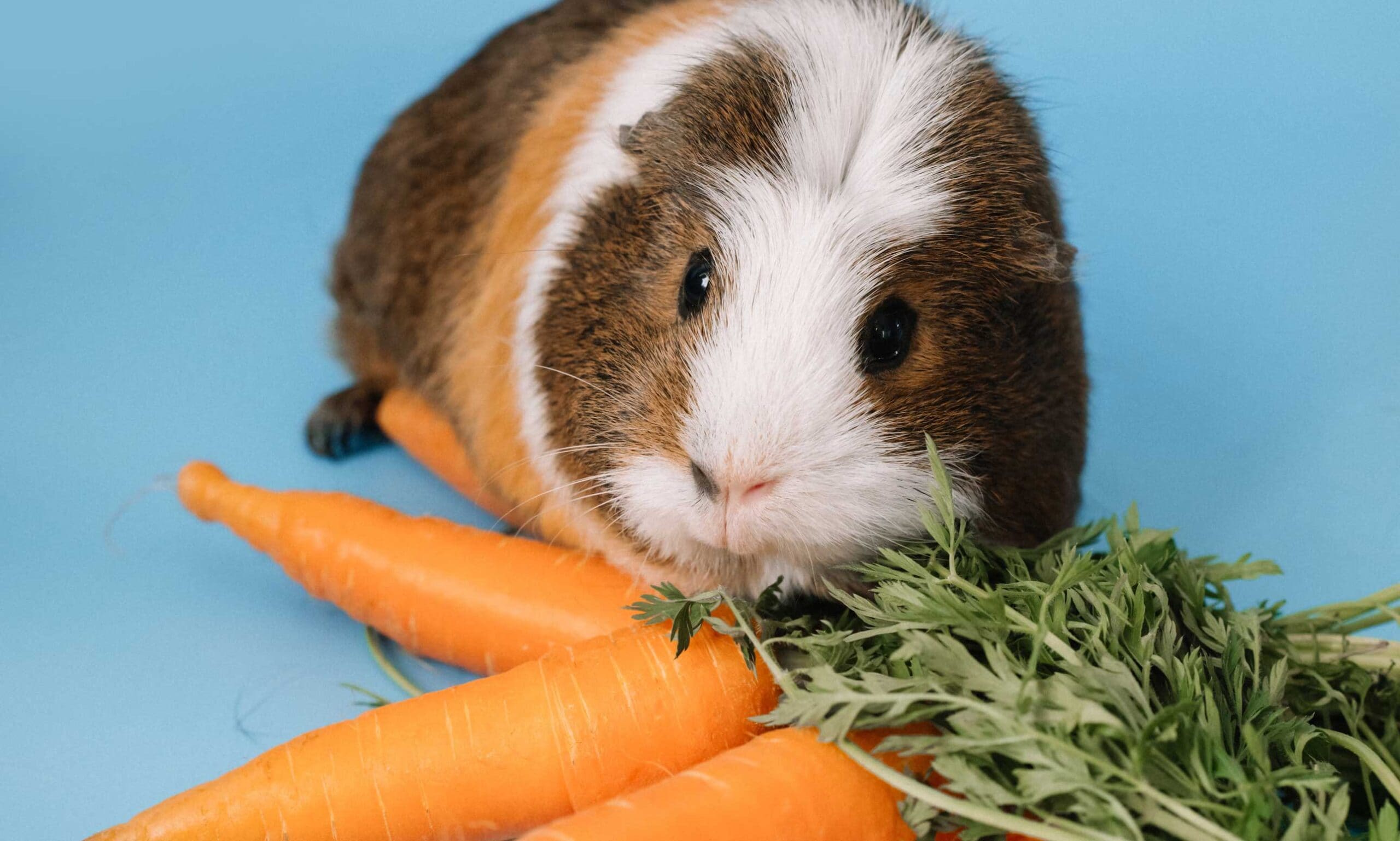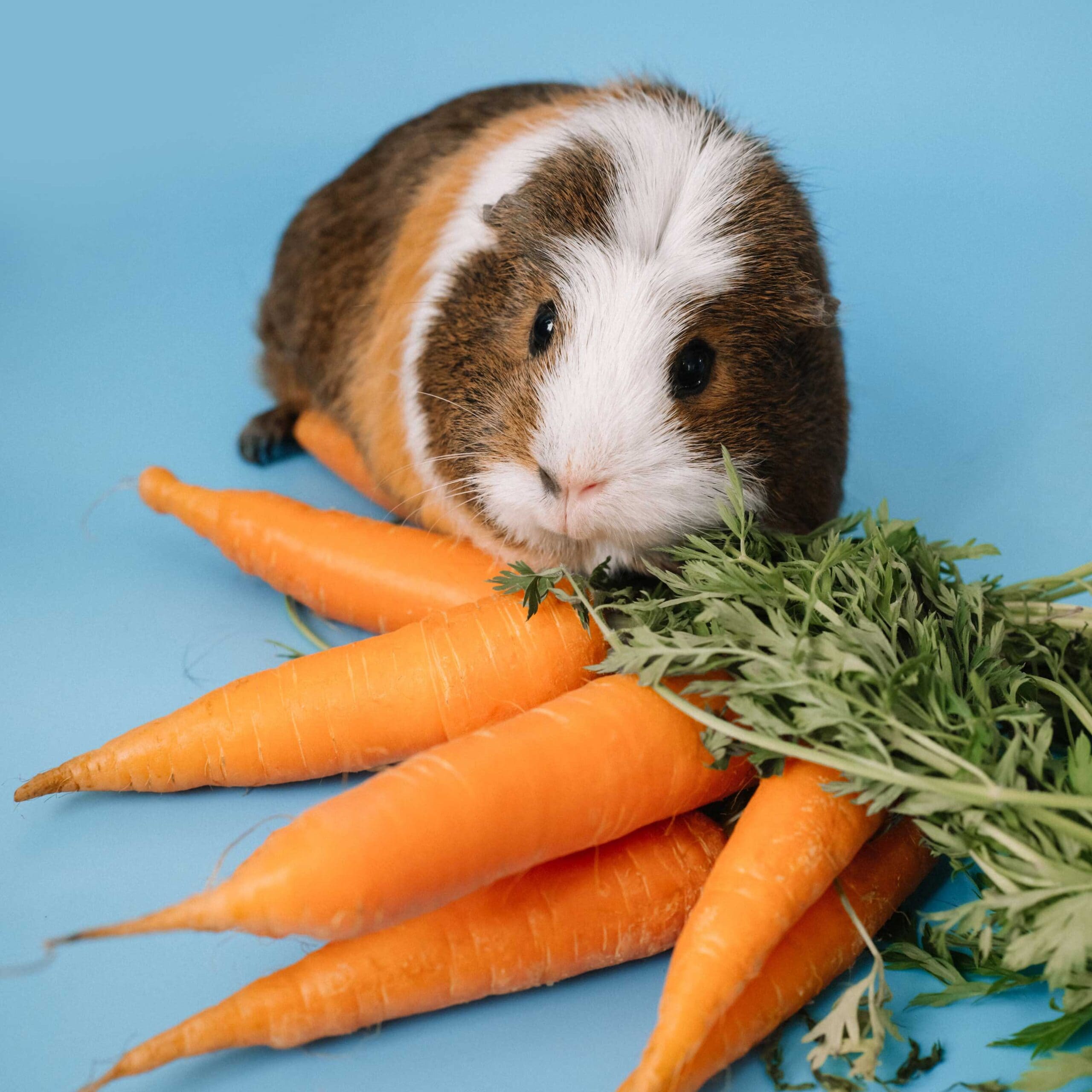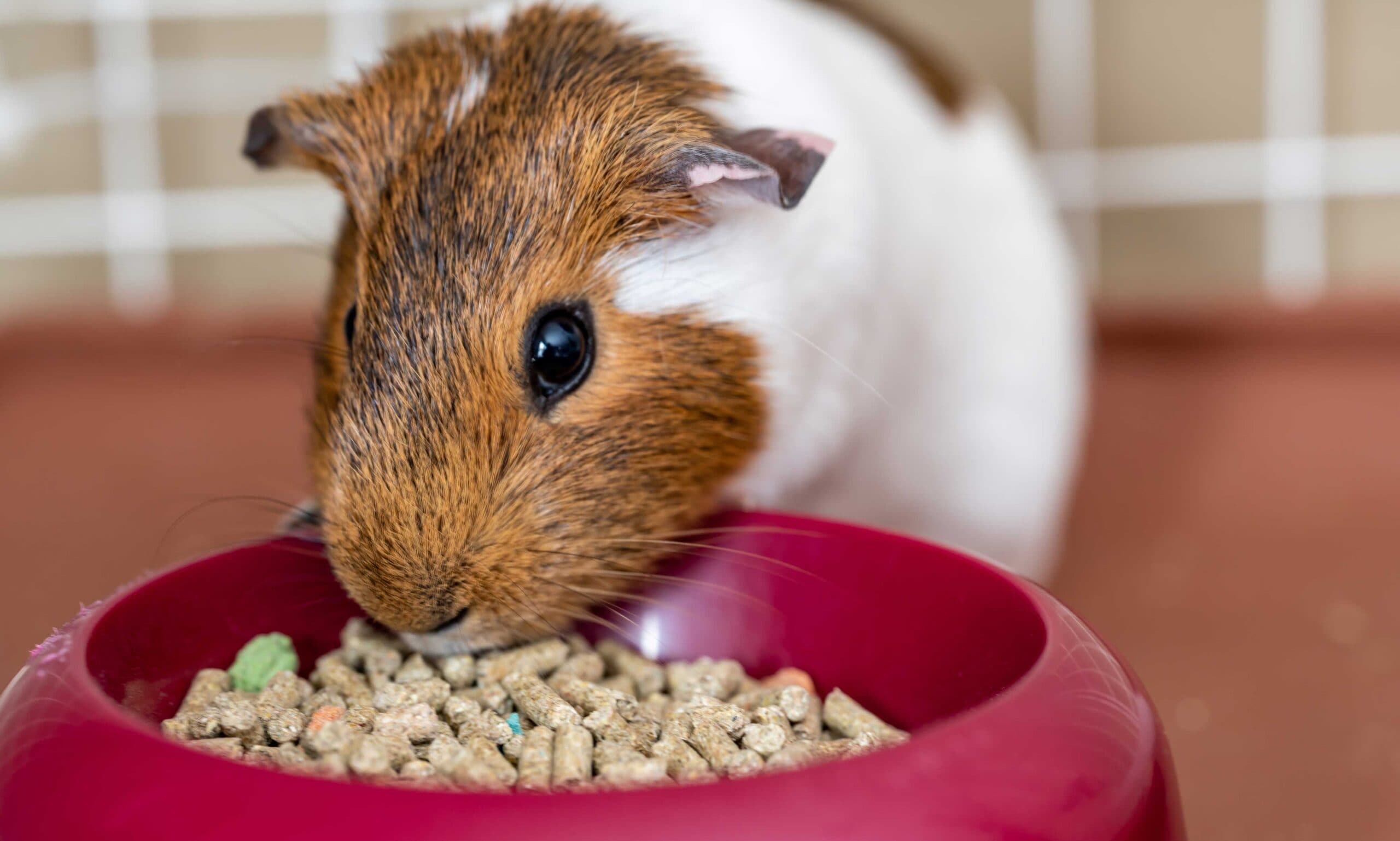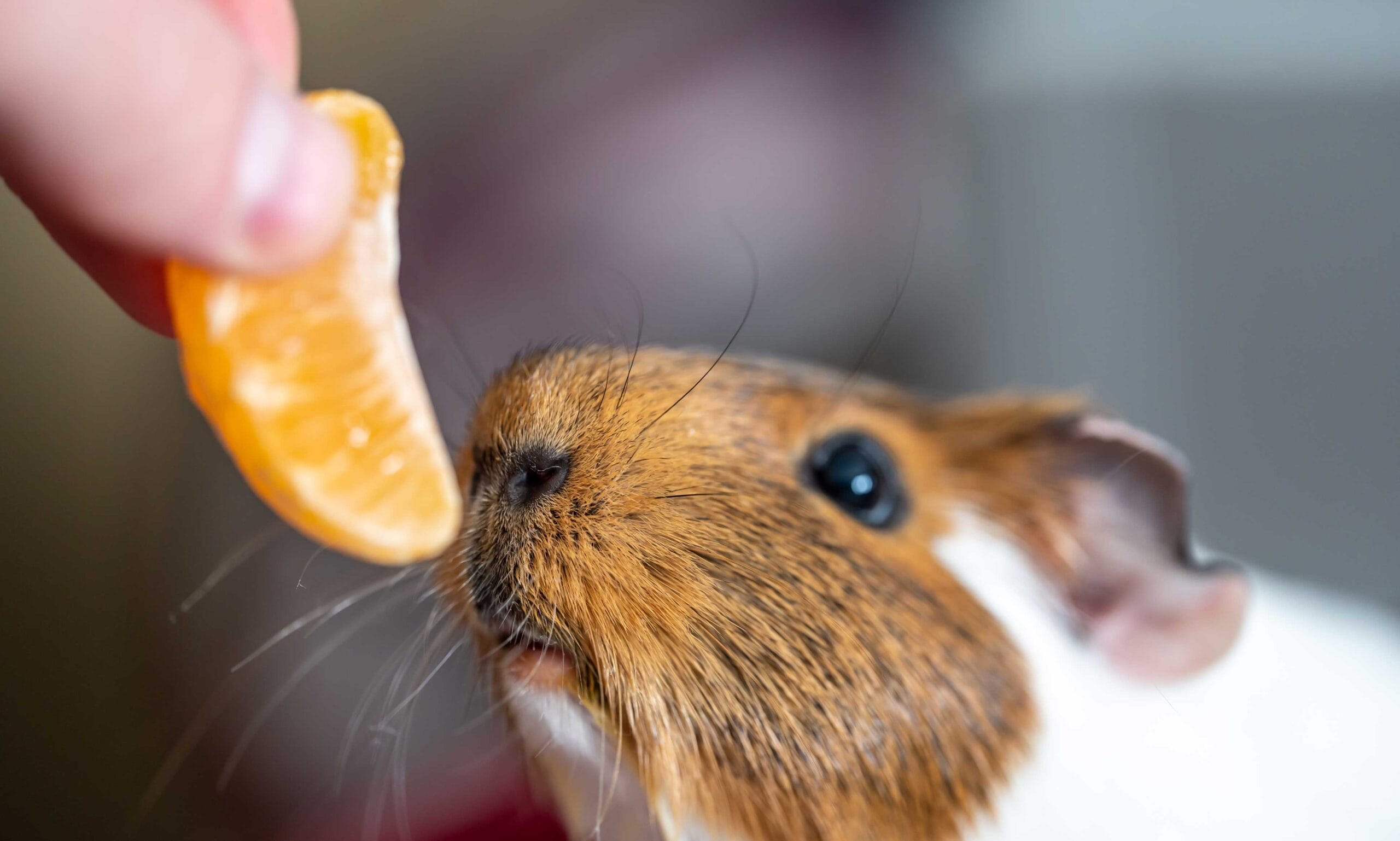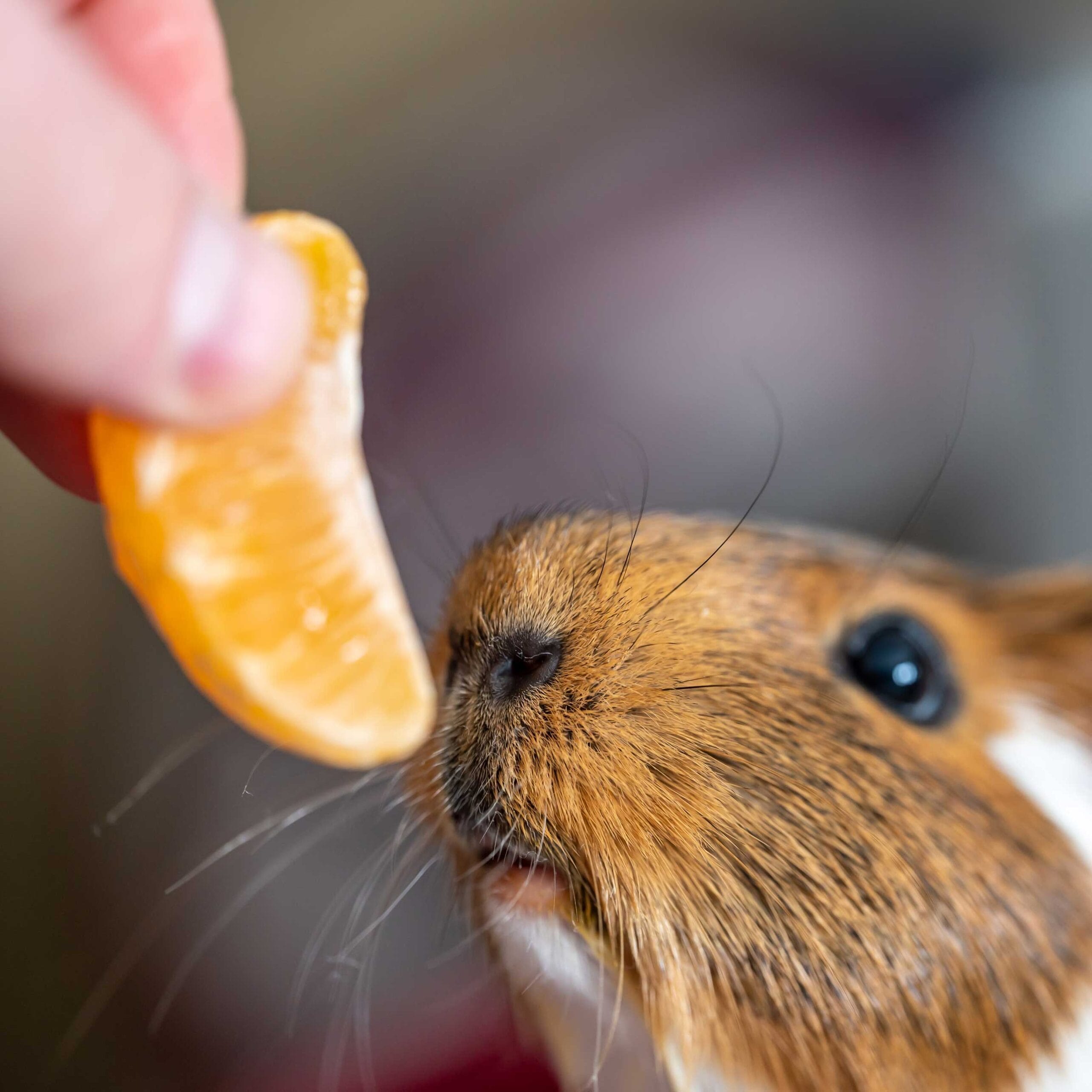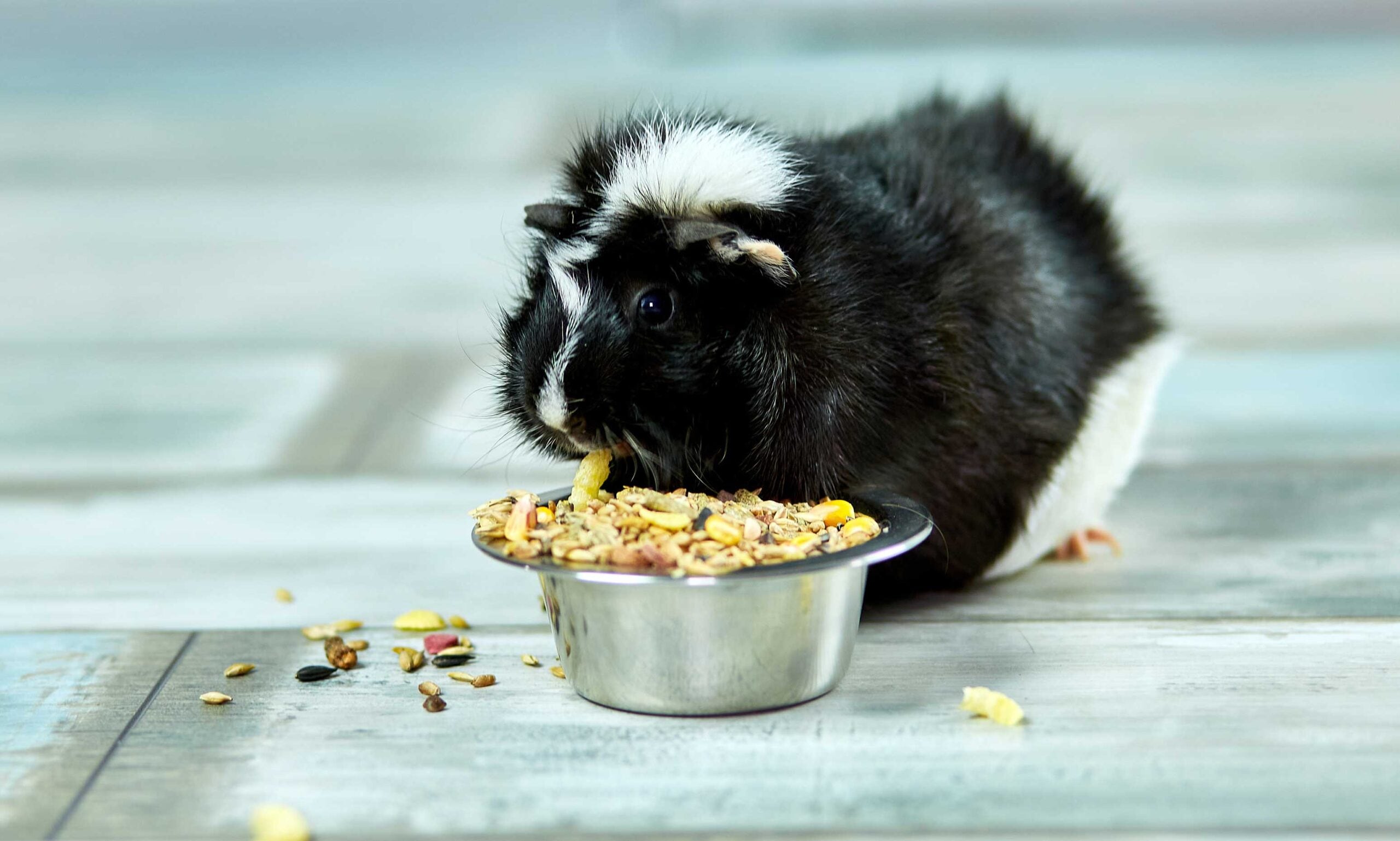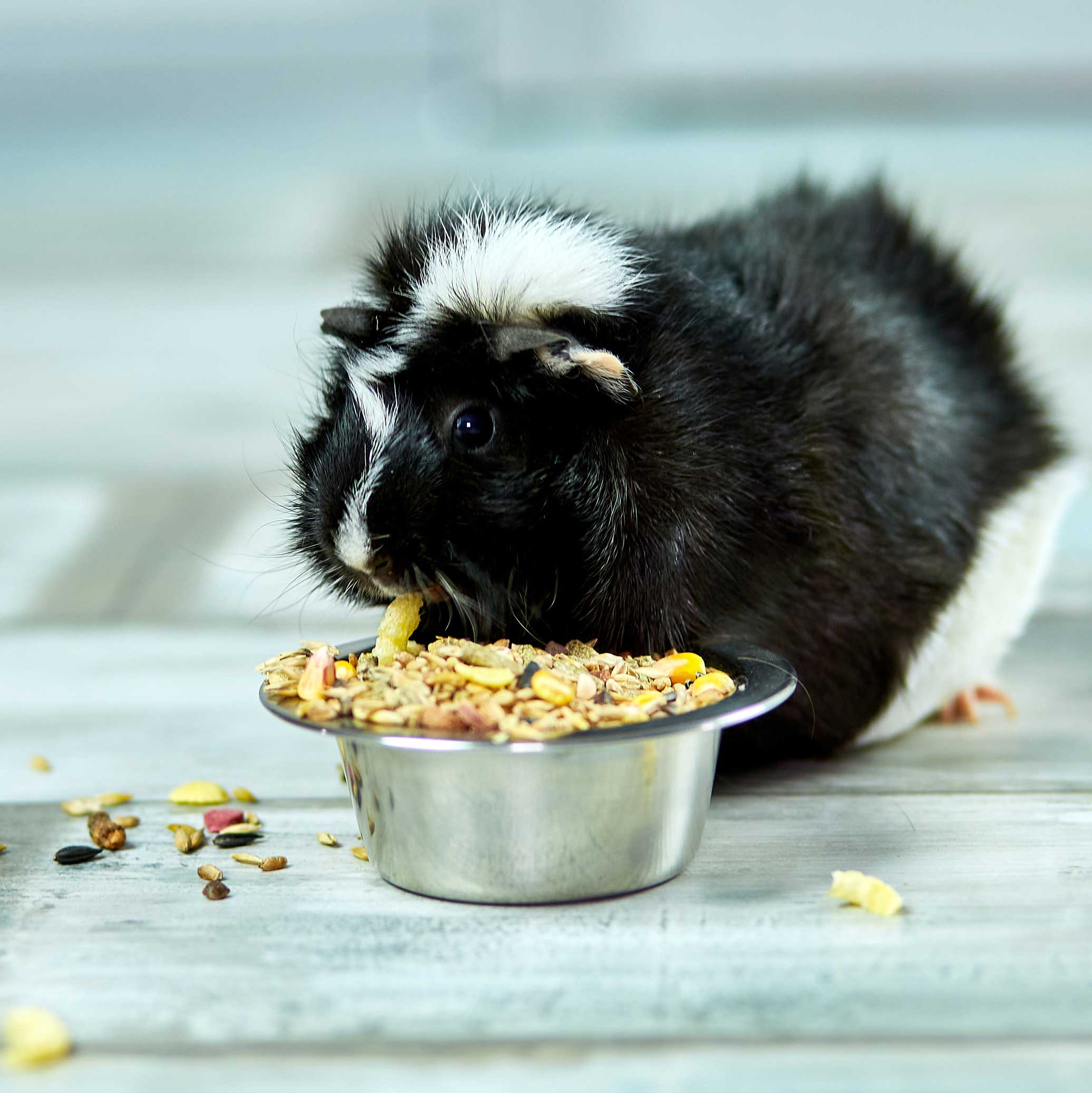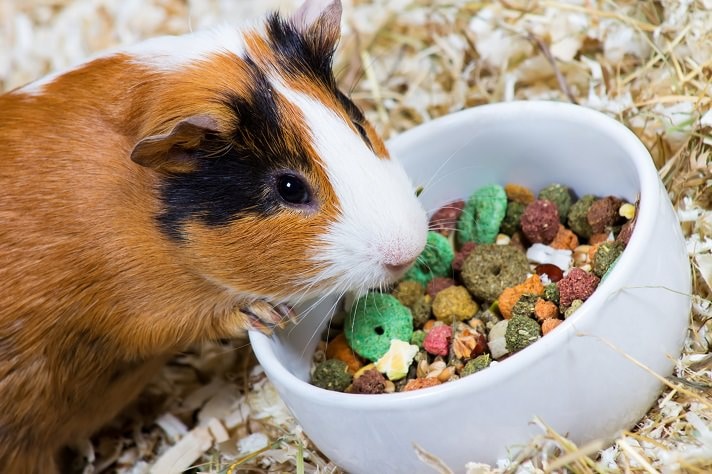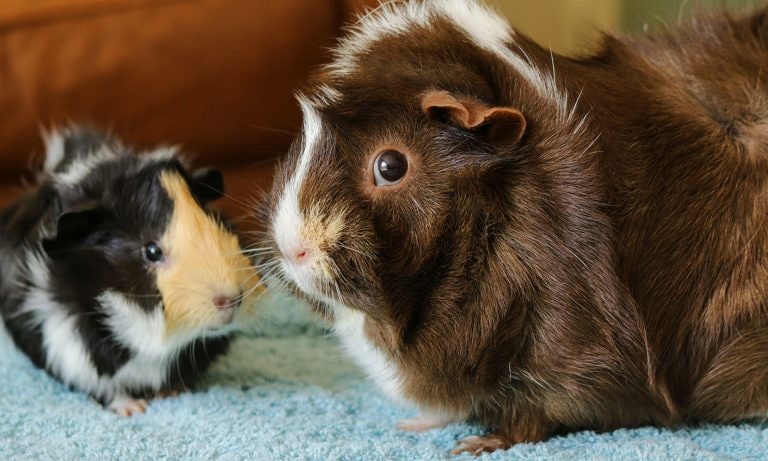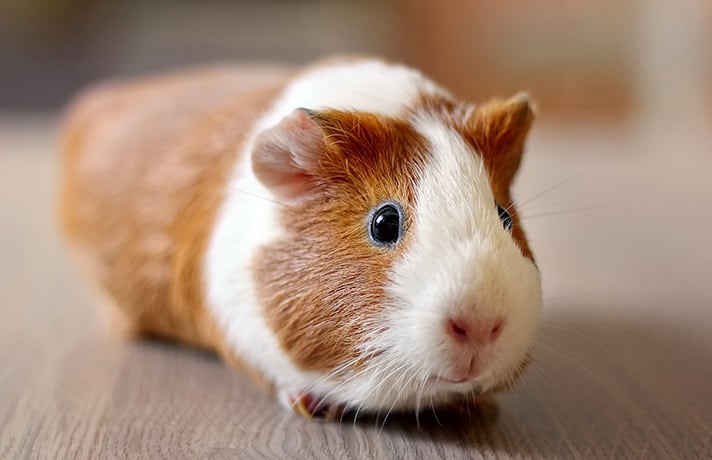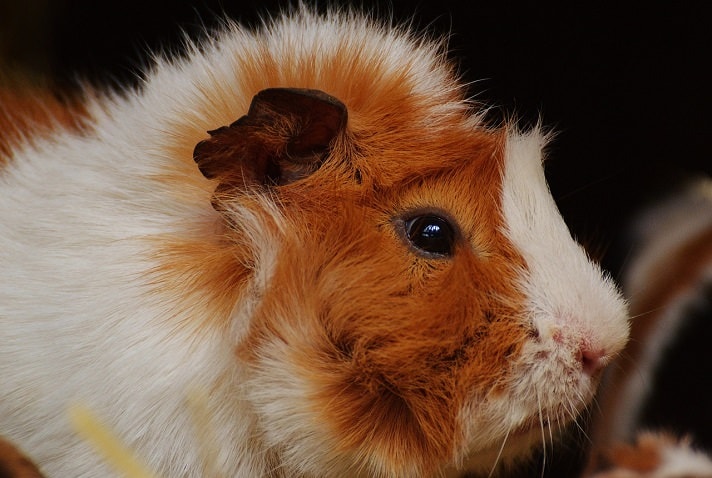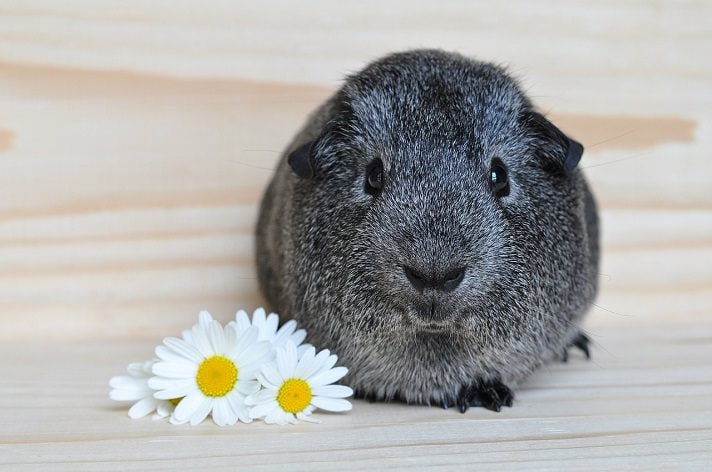While guinea pigs may be tiny, their appetite is mighty. Born with cute, strong teeth and an insatiable curiosity, these pocket pets may chomp on anything you put in front of them, which is why it’s important to feed only the right foods to your piggy. But what exactly do guinea pigs eat?
We spoke with cavy-savvy vets to learn more about what guinea pigs eat, how much to feed them, and dietary tips for easy feeding for you and healthy eating for your guinea pig.
Hay
The amount of fiber in hay helps keep guinea pigs healthy and promotes gut and dental health, says Hilary Stern, DVM, DABVP, founder and owner of the Exotic Pet Clinic of Santa Cruz in Scotts Valley, California.
All 20 of your guinea pig's teeth never stop growing, which means they must nibble and gnaw on things to keep their chompers at a manageable length.
Guinea pigs who don’t eat hay—or enough of it—can get overgrown teeth and often have gastrointestinal problems, Dr. Stern says. The overgrowth of guinea pig teeth is called malocclusion, and if left untreated, it can lead to malnourishment and starvation.
Chewing also helps keep guinea pigs mentally stimulated, and it helps fulfill their natural desire to burrow and build.
“The desire to chew is one reason your guinea pig needs access to fresh hay,” says Amy Kurowski, a veterinarian at Bloomingrove Veterinary Hospital in Rensselaer, New York. “Chewing on fresh hay is a low-calorie, high-fiber option that aids in digestion and prevents his teeth from overgrowing.”
There are two main types of hay guinea pigs can eat:
- Grass hays such as timothy, orchard grass and meadow hay are ideal for full-grown, non-breeding guinea pigs.
- Leguminous hays such as clover and alfalfa hay are high in protein and calcium. These are suitable for young guinea pigs as well as pregnant and lactating guinea pigs.
There are also grain-based hays, such as oat, barley, and wheat. Because these are types of grass hay that are higher in calories, they should be fed in small quantities as a treat.
When feeding pet guinea pigs hay, be sure to feed the life stage–appropriate hay and switch to fresh grass hay as your piggy becomes an adult.
The reason for this, Dr. Stern explains, is that the increased calcium and protein in clover or alfalfa hay can lead to bladder stones, kidney stones and an overproduction of cecotropes—the soft droppings guinea pigs eat—in non-breeding piggies.
Rhubarb should also be avoided, as it contains a substance called oxalic acid, which can be harmful to guinea pigs and other animals such as hamsters, interfering with calcium absorption and leading to health issues like kidney stones.
Quality hay products Dr. Stern recommends include Small Pet Select Timothy Hay and Oxbow Alfalfa Hay (for young, growing guinea pigs and pregnant and lactating guinea pigs).
Because hay is vital to overall guinea pig health, Dr. Stern says it should be the mainstay of their diet and recommends feeding unlimited amounts of fresh, clean hay every day.
Vegetables
The slightest crinkle of a plastic produce bag can send guinea pigs into an adorable wheeking frenzy. That’s because these voracious herbivores (animals who consume mostly plants for their source of nutrition) know it’s time for their favorite foods: vegetables.
Some veggies guinea pigs can eat include:
- Bell peppers (e.g., red, green, yellow)
- Green leaf lettuce
- Parsley
- Kale
- Broccoli
- Romaine lettuce
- Cabbage
- Turnip greens
- Collard greens
- Cilantro
- Dandelion greens
- Carrots (and carrot tops)
- Brussels sprouts
Unlike most pets—but like humans—guinea pigs can’t produce their own vitamin C and require it in their diet every day, Dr. Stern says, adding that the “most effective and fun way to ensure your guinea pig gets enough of this nutrient is to offer fresh leafy greens daily.”
Dr. Stern recommends offering a handful or two of fresh greens to your guinea pig every day, whenever possible. On days when this isn’t possible, give your piggy a vitamin C supplement.
When feeding veggies to your guinea pig, Dr. Stern shares the following tips:
- Only feed fresh vegetables that aren’t spoiled or moldy.
- Rinse vegetables thoroughly to remove any contaminants before feeding them to your pet.
- If your pet has a history of developing bladder stones or sludgy urine, avoid vegetables high in calcium.
- Avoid feeding starchy vegetables such as potatoes.
Guinea Pig Food
“The nutritional content of hays and vegetables can vary with where they are grown and how they are stored after harvesting,” Dr. Stern says. “Offering a small amount of a high-quality pellet daily (no more than 2 tablespoons per guinea pig per day) acts as nutritional insurance, making sure that no essential nutrients are missed.”
As for which pellets to offer your pig, Dr. Stern says plain pellets are best. Guinea pig food blends made with added dried seeds, fruits and grains can cause some pets to become obese or malnourished due to picking out their favorite treats and avoiding eating the more nutritious pellets.
Three guinea pig food options to try include:
Fruits
So, what fruits do guinea pigs eat? Some safe options include:
- Strawberries
- Bananas
- Blueberries
- Kiwis
- Oranges
Guinea pigs can eat most types of fresh fruits, but one in particular Dr. Stern says to never feed is avocado, as it’s toxic to many rodents and other animals.
She adds that guinea pigs can enjoy a small piece of fruit (about 1 teaspoon) as an occasional treat due to the high sugar content. And although some fruits are high in vitamin C, she says they shouldn’t be fed often since they can upset your guinea pig’s tummy.
Treats
However, “it’s absolutely crucial that you feed your guinea pig the right type of treats,” says Dr. Kurowski. “Guinea pigs should never be offered pastas, meats or dairy products.”
Most store-bought treats for guinea pigs aren’t beneficial to their overall health, either, according to Dr. Stern. She explains that they tend to contain a lot of sugar and fat and are low in fiber, which can cause gastrointestinal problems and obesity.
However, a few brands such as Oxbow and Science Selective make hay-based treats, like Oxbow Simple Rewards Timothy Small Animal Treats, that are high in fiber and low in sugar. These are fine as long as the guinea pig gets only one treat per day, Dr. Stern says. Others are essentially junk food for your guinea pig.
Healthy guinea pig treats Dr. Stern recommends include:
- Fresh vegetables
- Edible flowers
- Branches and leaves from nontoxic plants (such as roses, apple trees and willow)
Supplements
The only time a guinea pig might need supplements is if they’re not fed enough vitamin C–rich vegetables every day. In this case, they should take a supplement containing 25 mg of vitamin C daily—like Oxbow’s Natural Science Vitamin C Supplement—to avoid the risk of scurvy, a disease caused by a deficiency of vitamin C, characterized by weakness, anemia and gum disease.
Other supplements are available for guinea pigs with medical issues such as joint, urinary or skin problems. And while they may help, Dr. Stern says they tend to be high in calories and should only be fed in moderation, with no more than one supplement taken per day.
Check with your vet before offering your guinea pig supplements.
Water
“They require significantly more water per pound of body weight than would a dog or cat of the same size,” says Dr. Stern.
Considering guinea pigs’ constant grazing, water is equally important for their digestive system and bladder health.
Fresh water can be served to guinea pigs in dripping water bottles and open bowls. However, Dr. Stern mentions most prefer drinking from water bottles.
Three good quality dripping water bottles and holders to try include:
Feeding Tips for Guinea Pigs
- Hay should make up at least 75 percent of your guinea pig’s diet. This is because hay contains the long fibers that keep the gut and teeth healthy.
- Provide your guinea pig with a daily source of vitamin C.
- Make diet changes gradually to ensure your guinea pig keeps eating, and have patience when offering a new food. Guinea pigs can be suspicious of new foods, so it may take a few days for a guinea pig to be willing to try their soon-to-be favorite new vegetable.
- Feed only the recommended daily amount of pellets to your guinea pig. Obesity, gastrointestinal problems, vitamin C deficiency and overgrown teeth are commonly seen in guinea pigs.
- Avoid feeding your piggy high-fat treats such as nuts and seeds.
More about caring for your guinea pig:
Share:
